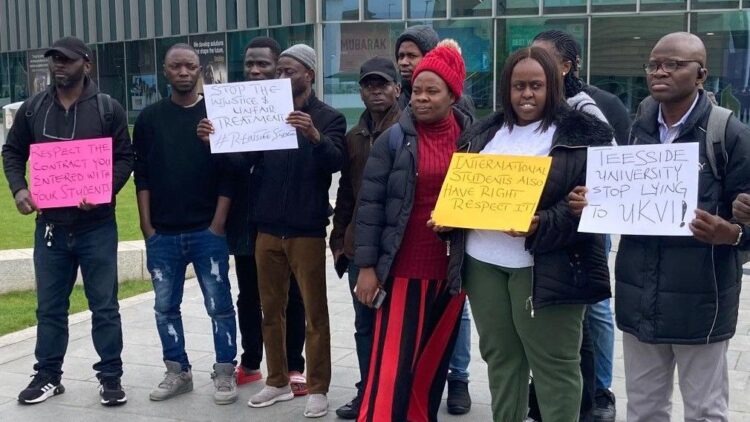By Lucy Caulkett-
Teesside University in the United Kingdom has expelled several Nigerian students and initiated their deportation due to unpaid tuition fees, citing strict compliance with UK immigration regulations.
The unpaid fees was due to the devaluation of the Naira-the Nigerian currency- which has plunged them into an unexpected crisis.”
Nigeria’s foreign exchange crisis and soaring inflation, which surged to 33.69 percent in April.
This decision has ignited significant backlash and protests from the affected students, who accuse the university of being “heartless” and unfair.
The university claims that it has no alternative but to enforce these measures due to strict external regulations.
Affected students have expressed their distress and disappointment to the BBC, criticising the university for being “heartless” and not offering adequate support.
Adenike Ibrahim, a student close to graduating, had her visa revoked despite having paid 90% of her tuition fees. “I did default [on payments], but I’d already paid 90% of my tuition fees, and I went to all of my classes,” she told the BBC.
She added that she had tried to reach an agreement with the university but received no assistance.
Another affected student, Esther Obigwe, has been struggling with depression due to the situation. She claims she repeatedly tried to communicate her financial difficulties to the university but received no response until she was blocked from her studies and ordered to leave the country.
“I attended all of my classes and seminars; I’m a hell of an active student,” Obigwe said. “It is disheartening; I am now on antidepressants, and being here alone, I have nobody to talk to.”
A university spokesperson stated, “Teesside University is proud to be a global institution with a diverse student population but is also very aware of its visa issuance and compliance obligations.
These strict external regulations ensure that the university fully supports a robust immigration system and are outside of the university’s control.”
The university explained that enforcing these measures was unavoidable, as non-payment of fees constitutes a breach of visa sponsorship rules.
Efforts were reportedly made to assist the affected students through bespoke payment plans.
Responding to the development, the UK Home Office stated that the decision to offer or withdraw visa sponsorship rests with the sponsoring institution.
When a visa is shortened or cancelled, individuals must “take steps to regularise their stay or make arrangements to leave the UK.” The Home Office informed the students that they had no right to appeal.
Image: BBC




